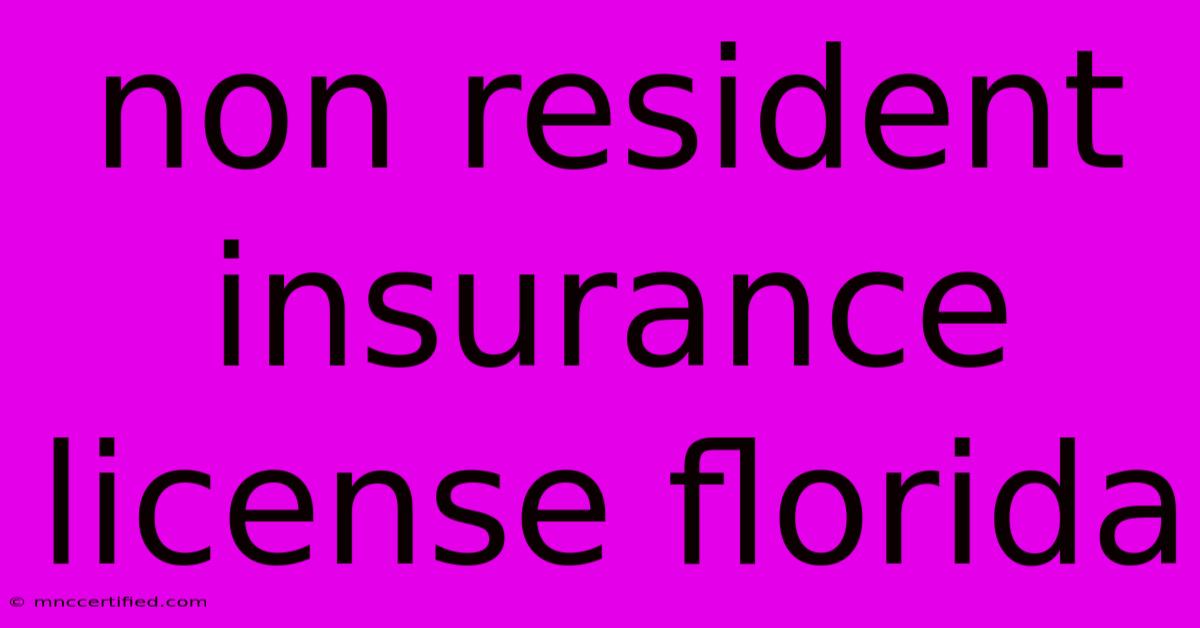Non Resident Insurance License Florida

Table of Contents
Navigating the Florida Non-Resident Insurance License: A Comprehensive Guide
Are you an insurance professional looking to expand your business into Florida? Obtaining a non-resident insurance license in Florida can open doors to new opportunities and clientele. However, the process can seem daunting. This guide will walk you through the essential steps, requirements, and considerations to help you secure your Florida non-resident insurance license.
Understanding Florida's Non-Resident Insurance Licensing Requirements
Before you dive into the application process, understanding the specific requirements for non-resident insurance licenses in Florida is crucial. The Florida Department of Financial Services (DFS) outlines these regulations, ensuring that only qualified professionals are granted licenses.
Key Requirements for Non-Resident Insurance Licenses in Florida:
- Resident License: You must hold a valid insurance license in your home state. This ensures that you have already met the basic educational and experience requirements for insurance professionals.
- Florida Application: You must submit a completed application for a non-resident license to the DFS. This application will require personal information, licensing details from your home state, and other relevant information.
- Fees: There are fees associated with the application process. You can find the current fee structure on the DFS website.
- Background Check: The DFS conducts a thorough background check to verify your identity and ensure you have a clean record.
- Continuing Education: Like resident licensees, non-resident licensees in Florida must complete continuing education courses to maintain their license. The required number of hours varies by license type.
- Appointment with an Insurance Company: You must be appointed by an authorized insurance company in Florida to conduct business in the state.
Types of Non-Resident Insurance Licenses in Florida
Florida offers various insurance license types, each catering to specific areas of expertise. Some common types include:
- Life and Health Insurance: Covers life, health, and accident insurance policies.
- Property and Casualty Insurance: Covers property damage, liability, and other related risks.
- Surplus Lines: Covers high-risk insurance products not available through traditional insurance companies.
- Independent Agent: Allows individuals to represent multiple insurance companies and offer various insurance products.
Choosing the Right License Type:
Carefully assess your expertise and the insurance products you intend to offer to determine the appropriate license type for your needs.
Step-by-Step Guide: Obtaining Your Florida Non-Resident Insurance License
- Verify Eligibility: Ensure you meet the basic requirements for a non-resident insurance license in Florida.
- Complete the Application: Access the DFS website and download the application form for the desired license type.
- Gather Required Documents: Compile all necessary documentation, including your resident license, proof of identity, and other supporting documents.
- Submit Application: Submit your completed application and all required documents to the DFS.
- Payment of Fees: Pay the associated fees through the DFS website or by mail.
- Background Check: The DFS will conduct a background check to verify your information.
- License Approval: Once your application is approved, the DFS will issue your non-resident insurance license.
- Appointment with Insurance Company: Contact authorized insurance companies in Florida to inquire about appointment opportunities.
Tips for Success
- Review DFS Regulations: Familiarize yourself with the latest regulations and requirements on the DFS website.
- Seek Professional Help: If you encounter any difficulties or have questions, consider seeking assistance from an insurance licensing specialist or attorney.
- Maintain Compliance: Stay informed about continuing education requirements and maintain compliance with all Florida insurance regulations.
Off-Page SEO Considerations
- Link Building: Reach out to relevant websites and blogs in the insurance industry and build relationships. Seek opportunities to guest post or contribute articles to these sites.
- Social Media Engagement: Actively participate in online insurance forums and social media groups. Share valuable content and engage with other professionals in the field.
- Local Business Listings: Ensure your contact information and business details are listed on local business directories, such as Yelp or Google My Business.
Conclusion
Obtaining a non-resident insurance license in Florida can be a rewarding endeavor. By following this comprehensive guide, you can navigate the licensing process efficiently and establish a successful insurance practice in the Sunshine State. Remember to stay updated on regulatory changes and seek guidance when needed. Good luck!

Thank you for visiting our website wich cover about Non Resident Insurance License Florida. We hope the information provided has been useful to you. Feel free to contact us if you have any questions or need further assistance. See you next time and dont miss to bookmark.
Featured Posts
-
Nicole Scherzinger Responds To Backlash
Nov 09, 2024
-
Thousands Call For Christmas Bonus Rise Dwp Responds
Nov 09, 2024
-
Gladiator Ii Casts Paul Mescal Alongside Ridley Scott
Nov 09, 2024
-
2036 Olympics At Risk Usha Officials Must Talk
Nov 09, 2024
-
Nba 76ers Vs Lakers Betting Preview Friday
Nov 09, 2024